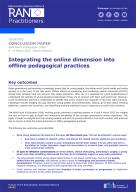Details
- Publication date
- 11 May 2022
- Author
- Directorate-General for Migration and Home Affairs
- RAN Publications Topic
- Internet and radicalisation
Description
Older generations are becoming increasingly aware that for young people, the online world (social media and online games) is in fact part of the real world. Offline efforts at preventing and countering violent extremism (P/CVE) should thus certainly take into account this online dimension. After all, it is essential for youth professionals to understand the entirety of young people’s experiences if they are to connect with them and build trust.
However, youth practitioners still find it challenging to identify this online content and integrate it into their daily practices. Challenges include bridging the gap between young people and professionals; staying up-to-date about trending platforms, content and narratives; and identifying working methods to use in classroom or youth work contexts.
The RAN Youth & Education (Y&E) working group convened a working session on 8 and 9 March 2022 for insights and tips on how to gain in-depth and immersive knowledge of the younger generation’s online experience. This paper is based on insights from the working session and aims to provide educators and youth workers with practical tips on how to include the online dimension in offline pedagogical practices.
The following key outcomes were identified.
- Since young people are the experts in this area, let them teach you. This can be achieved in various ways:
- give them a subject to research online, and discuss the related sources, platforms and narratives;
- show them familiar content on your smartphone and let them explain it to you (this may form a foundation for further discussion: begin the conversation on a neutral topic, and gradually move to more controversial content).
- Be open to reflective conversations on online content, without interrupting, prescribing or judging: a young person may share something controversial that they do not necessarily support or even really understand.
- The long periods of time young people spend online is not always concerning. Focus on the quality rather than the quantity; the internet is also a space for belonging and personal (talent) development. Empower pupils by giving them space to share their online passions. In both positive and negative instances, it is important to stay acquainted with their activities.
- Youth workers and teachers should have freedom in their curriculum or programme to implement methods to connect to this online dimension.

